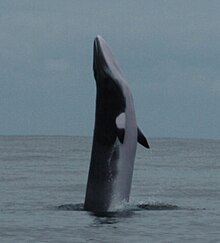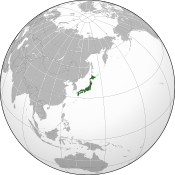Annual Japanese whaling campaign kills 30 minke whales
Sunday, June 15, 2014

Image: Rui Prieto.
Japanese officials announced on Friday the country's annual whaling expedition to the north-west Pacific Ocean has captured and killed 30 minke whales. This comes after the International Court of Justice (ICJ) banned Japan from continuing its Antarctic scientific whale hunting programmes in March this year.
The Australian and New Zealand governments had brought the Antarctic whaling issue to the attention of the ICJ earlier this year. The JARPA II whaling programme had been officially classified as scientific research, however when the programme had been investigated at the ICJ, the court decided there wasn't enough science involved to justify it. They ordered Japan to stop whaling in the Antarctic, but this ruling only mentioned JARPA II — not the annual Pacific whaling hunts.
This has allowed whaling to continue in the north-west Pacific Ocean. Even after the court had ordered the termination of JARPA II, sixty per cent of Japanese citizens still believed scientific whaling should go on, as measured in a poll conducted by the Asahi Shimbun newspaper in April 2014.
This sentiment was echoed by Japanese Prime Minister Shinzo Abe, who recently stated he intended "the resumption of commercial whaling by conducting whaling research in order to obtain scientific data indispensable for the management of whale resources."
The International Fund for Animal Welfare says up to 200 minke whales can be hunted during the North Pacific expedition. Japan has maintained scientific whaling programmes intend to understand the global whale populations, with the research programmes aiming to prove the global whale population is sustainable, allowing commercial whale hunting to resume.
Japan's Ministry of Agriculture, Forestry and Fisheries had also planned to petition the International Whaling Commission next year with a new Antarctic whaling proposal.
Sources
- "Japan kills 30 minke whales in ‘research’ campaign following intl court ban" — Russia Today, June 14, 2014
- Jack Simpson. "Japan kills 30 minke whales in first hunt since ICJ ruling" — The Independent, June 14, 2014
- "Asahi poll: 60% of Japanese want whaling to continue" — The Asahi Shimbun, April 22, 2014



